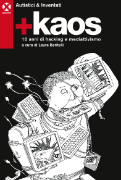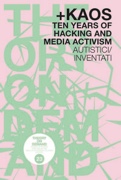La cosa dall’altro mondo
Il susseguirsi di nascite e di morti segna in questo periodo più delle lancette dell’orologio la mia percezione del tempo. Nascite che rendono felici amici, e morti che lasciano il segno su pochi o altre che vorrebbero scuotere e traumatizzare il mondo intero.
La dialettica tra forze materiali che imprime forma alla realtà è quanto mai schizofrenicamente attiva in questo periodo.
Solo fino a poche settimane fa i maggiori quotidiani nazionali erano un tripudio di emergenzialismo, e testosterone: tra l’operazione Aquila Nera tesa a stroncare sul nascere la (parecchio sgangherata) organizzazione neofascista Avanguardia ordinovista e gli incendi ai cavi sulla linea della Tav, che a tratti assumevano le sembianze smostrate di una novella strage di Bologna. O qualche giorno prima i sindacati che bloccano il paese o gli “antagonisti” che vogliono sempre fare a botte. Come se ci fosse una galassia in violenta espansione tesa ad inghiottire il mondo, un’entità aliena pronta ad invadere la quotidianità, che invero ha continuamente bisogno di sentirsi minacciata, aggreddita, perché le sue basi e ragioni sono talmente fragili, da rafforzarsi solo di fronte al nemico comune, all’emergenza traumatica, che cancella i dubbi e lascia liberi di agire a riconfermare un presente identificato con il migliore dei mondi possibili o il minore dei mali necessari.
Tutta questa costruzione un po’ scriocchiolante lascia il posto a Parigi, dove la guerra che serpeggia da decenni esplode nelle sue dinamiche di rancore, inteso come odio consapevolmente lasciato fermentare. Questa sì che sembra un’invasione aliena, terrifica e oscura, mediaticamente appagante e pornografica come le stragi nei college statunitensi, con la caccia all’uomo, gli ostaggi, gli assalti, ecc…
Eppure aliena non è, tutto questo non è alieno alla nostra società, anche se sarebbe comodo che lo fosse. Poter stigmatizzare la violenza e fermarsi lì, dedicarsi a curare i sintomi, per sentirsi rassicurati.
Serpeggia un desiderio di controllo, spesso su aspetti marginali della questione, che sembra quasi una mera esibizione di forza, o paranoia. Un mondo schizofrenico che da un lato osanna la libertà d’espressione offesa a morte e dall’altro vorrebbe controllare ogni sistema di comunicazione, vietando quello che apparentemente sfugge (affermazioni da campagna elettorale britannica fresche fresche di David Cameron, http://tinyurl.com/nhoeceu).
In generale un po’ ovunque i governi si pongono pubblicamente la questione come un problema di sorveglianza. Ci si pone di fronte ai territori come se fossero dei fortini assediati da difendere, da presidiare, da sorvegliare.
Ma sono ben consapevoli che è soltanto propaganda. Le reti telefoniche prima dell’avvento di Internet, erano strutture relativamente facili da controllare, questo non ci ha risparmiato guerre, violenze e fattacci brutti brutti negli ultimi 100 anni.
Perché il problema non sta lì, non sta nella quantità di cose che sorvegliamo. Non sta nell’analisi delle comunicazioni digitali di tutti gli abitanti del mondo, anche se i governi apparentemente sembrano pensarla così, in una sorta di fragile delirio di onnipontenza, estraneo ad ogni valutazione di altro genere. Valuazioni che comunque vengono fatte, ma spesso taciute, perché è più facile dare in pasto all’opinione pubblica qualche inutile ricetta, piuttosto che ammettere che tutto fa parte di un crudele e cinico gioco ad incastri in cui le ragioni dell’economia, della geopolitica, gli scontri di potere si celano dietro paraventi di comodo. Più semplice ripartire sempre da zero e immaginare gli alieni che vengono a rapire la nostra placida quotidianità, come se questo “idillio” non fosse normalmente costruito sull’incertezza, sullo sfruttamento, sulla disuguaglianza sociale, sull’imposizione, sulla paura, sulle ragioni del denaro e del profitto sopra ogni altra questione.
Gli alieni venuti a rubare le nostre pecore e tracciare sanguinosi cerchi nel grano, sembrano alieni, perché spesso noi pure siamo alieni a noi stessi e stentiamo a riconoscere la nostra immagine riflessa e distorta nelle acque di questo strano ruscello post moderno in cui ci laviamo il volto.
Nowadays my sense of time is marked more by the succession of births and deaths than by the ticking of the clock. Births that make friends happy, and deaths that leave their mark on few or that aim at shocking and traumatizing the whole world.
Today, the dialectics among material forces that forms reality is more schizophrenically active than ever.
Just few weeks ago, the most important Italian newspapers were full of fake emergencies and testosterone — between the “Aquila Nera” (or “Black Eagle”) operation, aimed at crushing the emerging (and rather rambling) neofascist organization “Avanguardia ordinovista” (“Vanguard for the New Order”), and the “arson attack” that set fire on some cables of the high velocity train line in Bologna, and was sometimes depicted as a new Bologna Massacre[1]. And what about the unions “bringing the country to a standstill”, or the “radical” groups who always want to get into a brawl. It’s as though there was a galaxy that is violently expanding in the effort of gobbling up the world, an alien being ready to overrun our everyday life — a life that always needs to feel threatened, under attack, because its foundations and motivations are so fragile, that they only get stronger in the face of a common enemy, of traumatic emergencies, that remove doubts and allow everyone to act as they like, enforcing a present that is identified with the best of all possible worlds or with the least of the necessary evils.
This whole pretty crumbling construct has been replaced by the events in Paris, where a war that had been looming for decades has exploded in its patterns of grudge, of a hate that had been consciously left to brew for a long time. This one really looks like an alien invasion, terrifying and obscure, media-oriented and pornographic as the massacres in American colleges, with manhunts, hostages, SWAT raids, etc.
But there is nothing alien in all this: nothing in all this is alien to our society, even if it would be comforting if it was. It would be comforting to simply stigmatize violence, to focus on the treatment of symptoms in order to feel reassured.
A yearning for control is in the air. It often concerns secondary aspects of the question, and actually seems a mere show of force, or of paranoia. We live in a schizophrenic world which at the same time celebrates the deeply injured freedom of speech, and wishes to control every communication system, and to forbid what apparently slips by (see the most recent declarations by David Cameron during his electoral campaign).
More generally, governments all over the world are openly discussing the question as a matter of surveillance. Each territory is treated as a fort under siege that must be protected, guarded and watched over.
But they all know that this is just propaganda. Before the emergence of the Internet, telephone networks were relatively easy to monitor, but this hasn’t spared us wars, violence and bad, bad deeds in the last 100 years.
For the point is this, and not the amount of things we surveil. The point does not consist in the analysis of the digital communications of each and every inhabitant of the planet, although the governments seem to believe this, in a sort of fragile omnipotence delirium that is alien to any other consideration. Some considerations are indeed made, but they are often kept secret, because it is easier to serve up some useless recipe to the public than to admit that all this is part of a cruel and cynical puzzle where the reasons of economics, geopolitics, and clashes of power are hidden behind a facade of convenience. It is easier to start from scratch over and over again, and to imagine some aliens who come to kidnap our peaceful everyday life, as though this “idyllic life” wasn’t normally built upon uncertainty, exploitation, social inequality, dominion, fear, and the reasons of money and profit above everything else.
The aliens who have come to steal our sheep and to draw bloody crop circles look like aliens because often we are also alien to ourselves, and we hardly recognize our twisted reflections in the water of this weird post-modern stream where we wash our faces.

